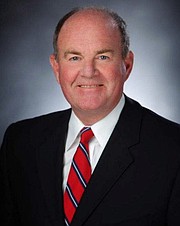Idaho GOP leaders tackle questions
By CRAIG NORTHRUP
Staff Writer
Conservative voters converged on North Idaho College Tuesday night to hear from their state’s Republican leadership and their own representatives during the last stretch of the Idaho House Republican Caucus town hall series.
The four leaders of the House caucus — Speaker of the House Scott Bedke, Majority Caucus Chair Megan Blanksma, Majority Leader Mike Moyle and Assistant Majority Leader Jason Monks — joined local legislators in a forum that addressed conservative concerns ranging from property tax relief to land management to Sharia law.
The 10 lawmakers began the evening with a brief introduction and a list of 2019 accomplishments and lessons from the previous session. The venue offered an early opportunity for local representatives to both explain their platforms and thank caucus leadership.
“Everybody down there [in Boise] is working hard representing their constituents,” Rep. Jim Addis (R-Coeur d’Alene) said. “While we might not agree on everything that comes up, I think it’s important for you to know everybody has worked hard to get something done.”
“I’d like to thank leadership for coming up here,” Rep. Ron Mendive (R-Coeur d’Alene) said. “I’ve never seen this happen before. I’m grateful. This is an opportunity for you to meet our leadership and an opportunity to show your support for us. I really appreciate that.”
Rep. Vito Barbieri (R-Dalton Gardens) said he was honored to represent his constituents and his party alike.
“My job, I think, is to clearly articulate a conservative, pro-life world view,” Barbieri said. “That is my heart. That is my responsibility with my district, and I think that’s the heart of the district. So I just continue to work on behalf of the taxpayer, trying to lower the taxes, trying to lower the spending … That’s my job, and I’m going to keep at it.”
Blanksma — who moderated the event — read questions submitted by attendees via notecards, as well as previously-submitted questions from both Kootenai County and across the state. One of the first questions to come across the table asked about the condition of Kootenai County’s infrastructure, particularly in relation to its roads. While local representatives discussed the funding and jurisdictive mechanisms that would ultimately dictate how roads will be maintained and repaired, Speaker Bedke said Idahoans would always pay more than its bordering neighbors because the sheer number of the state’s land miles outnumber people.
“It’s always going to be more expensive for us when we deal with growth,” he said. “It’s always going to be a challenge for us to find a revenue source to keep an infrastructure up and rolling, and our economies depend on that.”
That growth conversation fell front and center in Coeur d’Alene, as Blanksma reported an email that claimed the city was in the midst of a “traffic Armageddon.”
“Our state is just beginning to figure out how to have the right revenue stream to improve our infrastructure,” Addis explained, “because quite frankly, just like with education, without a superb infrastructure system, our state will not achieve, and some will say our state will fail. I don’t have a magic bullet, because it costs money.”
Blanksma asked the representatives to explain their positions on urban renewal boards serving while unelected — an issue still on the taste buds of locals after Coeur d’Alene passed its fourth district in early December, a Health Corridor district financed through urban renewal. While local representatives drew silent on the issue, Moyle spoke up in opposition.
“We’ve been trying for several years to force urban renewal boards to be elected,” Moyle said. “Remember they’re creations in most places by the cities … The cities create these things and they generally put themselves on to manage it. The problem I have with that is, they’re spending taxpayer dollars, and I think when you’re spending taxpayer dollars, there ought to be elected proof that goes in there and deals with those and has the authority to do it.”
In a roundtable-esque discussion, Rep. John Green (R-Post Falls) said property taxes have become a burden to landowners, an economic illness that requires a remedy.
“Because of our property tax system,” Green said, “we don’t really own our property. We just rent it. So I think it’s time to start looking for a different model. I think we can realistically look at getting rid of property tax.”
He suggested the Legislature should consider other tax revenue streams, such as excise taxes or additional taxes on goods and services, to replace property taxes.
Other conservative talking points were brought up through the questions, including the marijuana initiative, the election of judges who would allegedly promote Sharia law, hypothetical legislation to combat chemtrails, a freeze on university funding and federally-instructed gender-neutral laws.
“It’s time for Idaho to start exercising her sovereignty,” Green, who sits on Idaho’s Health and Welfare committee, said to a wave of applause from the audience. “I have a difference of opinion on the legal outlook of this particular issue (regarding gender assignment on birth certificates and government documents). We just need to start telling these federal courts, ‘No.’”













